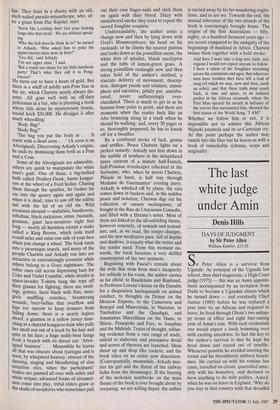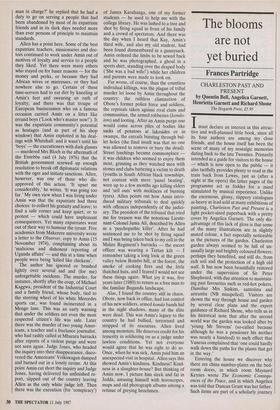The last white judge under Amin
Denis Hills
DAYS OF JUDGMENT by Sir Peter Allen William Kimber, .£13.50 Sir Peter Allen is a survivor from Uganda. As principal of the Uganda law school, then chief magistrate, a High Court judge (1973) — this was an Amin appoint- ment accompanied by an invitation from Dada to become a Ugandan citizen which he turned down — and eventually Chief Justice (1985) before he was replaced a year later by an African and required to leave, he lived through Obote's two unhap- py terms of office and eight hair-raising year of Amin's rule. With such credentials one would expect a book brimming over with exciting anecdotes. In fact the key to the author's survival is that he kept his head down and stayed out of trouble. Whenever possible he avoided meeting the tyrant and his bloodthirsty military hench- men. He carried on with his routine law cases, travelled on circuit, quarrelled amic- ably with his houseboy, and declined to have anything to do with politics. Asked, when he was on leave in England, 'Why do you stay in that country with that dreadful man in charge?' he replied that he had a duty to go on serving a people that had been abandoned by most of its expatriate friends and in its dark days needed more than ever persons of principle to maintain standards.
Allen has a point here. Some of the best expatriate teachers, missionaries and doc- tors continued to work under Amin out of motives of loyalty and service to a people they liked. Yet there were many others who stayed on for baser reasons — for the money and perks, or because they had African wives or mistresses, or they had nowhere else to go. Certain of these time-servers had to eat dirt by kneeling at Amin's feet and swearing an oath of loyalty; and there was that troupe of European businessmen who on a famous occasion carried Amin on a litter like errand boys (Took who's master now!'). It was the expatriate community's potential as hostages (and as part of his shop window) that Amin exploited in his deal- ings with Whitehall: and it wasn't until his 'boys' — the executioners with dark glasses — murdered Mrs Bloch in the aftermath of the Entebbe raid (4 July 1976) that the British goyernment screwed up enough resolution to break off diplomatic relations with the ogre and initiate sanctions. Allen, however, was one of those who dis- approved of this action. 'It upset me considerably,' he writes. 'It was going too far.' My own view when I was living under Amin was that the expatriate had three choices: to collect his gratuity and leave; to find a safe corner and keep quiet; or to protest — which could have unpleasant consequences. Yet many expatriates went out of their way to humour the tyrant. Five academics from Makerere university wrote a letter to the Observer, copy to Amin (15 November 1974), complaining about its 'malicious and dishonest reporting of Uganda affairs' — and this at a time when people were being 'killed like chickens'.
The author has ignored or brushed lightly over several sad and (for me) unforgettable incidents. The murder, for instance, shortly after the coup, of Michael Kaggwa, president of the Industrial Court and a family friend, whose body, tied to the steering wheel of his white Mercedes sports car, was found incinerated in a Mengo lane. This was an early warning that under the soldiers not even the most respected citizen's life was safe. Later there was the murder of two young Amer- icans, a teacher and a freelance journalist, who had rashly called at Mbarara barracks after reports of a violent purge and were not seen again. Judge Jones, who headed the inquiry into their disappearance, disco- vered the Americans' Volkswagen dumped and burned out in a lonely ravine. At this point Amin cut short the inquiry and Judge Jones, having delivered his unfinished re- port, slipped out of the country leaving Allen as the only white judge left. Then there was the execution (for 'conspiracy') of James Karuhanga, one of my former students — he used to help me with the college library. He was lashed to a tree and shot by firing squad in front of his family and a crowd of spectators. And there was the day when I heard that Kay, Amin's third wife, and also my old student, had been found dismembered in a gunnysack. Amin ordered the limbs to be sewed back and he was photographed, a ghoul in a sports shirt, standing over the draped body (`She was a bad wife!') while her children and parents were made to look on.
Far worse, of course, than the countless individual killings, was the plague of tribal murder let loose by Amin throughout the country: the ruthless elimination of Obote's former police force and soldiers, the reprisals taken against rival clans and communities, the armed robberies (kondo- ism) and looting. After an Amin purge one would come across piles of bodies like sacks of potatoes at lakesides or in swamps, the entrails bursting through bul- let holes (the final insult was that no one was allowed to remove or bury the dead). Street lynchings became commonplace — it was children who seemed to enjoy them most, grinning as they watched men with stones and clubs battering a victim to death (youths in South African black townships, not content with mere 'panel beating', were up to a few months ago killing elders and 'sell outs' with necklaces of burning tyres). Allen points out how Amin intro- duced military tribunals to deal quickly with offences independently of the judici- ary. The president of the tribunal that tried me for treason was the notorious Lieute- nant-Colonel Juma Ali, described by Allen as a 'psychopathic killer'. After he had sentenced me to be shot by firing squad and I was being taken back to my cell in the Malire Regiment's barracks — the escort officer was wearing a Tartan kilt — I remember taking a long look at the green valley below Bombo hill, at the forest, the smoke of cooking fires and the little thatched huts, and I feared I would not see these things again. What joy it was, five years later (1980) to return as a free man to the familiar Buganda landscape.
Alas, I found the country still in chaos. Obote, now back in office, had lost control of his new soldiers, armed kondo bands hid in the night shadows, many of the elite were dead. This was Amin's legacy to the country he had bullied, terrorised and stripped of its resources. Allen lived among monsters. He deserves credit for his temerity in soldiering on as a judge under lawless conditions. Yet not everyone would agree that he was right to do so.
Once, when he was sick, Amin paid him an unexpected visit in hospital. Allen says this showed Amin's kindness. Kindness? Kind- ness in a slaughter-house? But thinking of Amin now, I picture him sleek and fat in Jedda, amusing himself with horoscopes, maps and old photograph albums among a retinue of greying henchmen.



















































 Previous page
Previous page